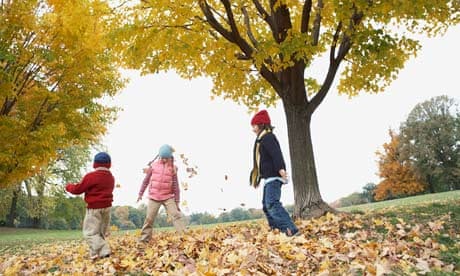Shifting Britain's clocks forward by one hour throughout the year could help fight childhood obesity, a new study suggests.
Researchers have shown that children of primary school age are more active and spend more time playing outside if the evenings are lighter – irrespective of the weather.
The findings, based on a study of 325 children, suggests that changing to Central European Time and delaying the time of sunset by one hour would boost exercise levels in youngsters and improve their health into adulthood.
Last month the government announced that it was considering moving the clocks forward by one hour for a three-year trial that would see British clocks fall into step with those of France, Italy and Germany.
Dr Anna Goodman of the London School of Hygiene and Tropical Medicine and her colleagues got 325 children aged eight to 11 in Hertfordshire to wear "accelerometers" – mobile phone-sized devices that measure physical activity – during term time throughout the school year.
Each of the children wore the device for a few days at a time while recording their activities in a diary. In total the researchers gathered data from 817 days' activity.
The children spent around 18% of their waking hours doing "moderate" or "vigorous" activity – mostly running and playing.
On both school days and weekends, activity was highest on days with more than 14 hours of daylight.
The biggest effect was between 5pm and 8pm on long summer days when they spent 22% of the time being active. During the same period in the spring, autumn and winter they spent just 13% of the time being active, she reports in the Journal of Physical Activity and Health.
Dr Goodman said the boost to children's activity was not simply caused by better weather in the summer. She found that rain and cloud cover made little difference to the amount that children exercised in the evenings.
Moving the clocks forward would lead to darker mornings in the winter when children are going to school. In northern Scotland the sun would not rise until 10am on the shortest days of winter.
However, the study found that the amount of daylight in the morning made little difference to children's activity, presumably because children's routines of walking or cycling to school were unaffected by whether it was gloomy or light.
The researchers – including scientists from University College London – did not investigate why the children spent less time playing outside on short, dark days. But they suspect it may be a combination of children being less keen to play and their parents being less keen to let them.
"The fact that this effect is specific to late afternoons suggests that it is to do with day length, and not the weather," said Goodman.
"On the basis of these findings, redistributing daylight hours to the afternoon would have good effects on children's physical activity. Even if the effects are small for an individual, there could be quite important effects on the whole population."
Critics of the UK government's proposed trial moving the clocks forward by one hour say darker mornings could lead to more accidents, particularly among children walking or cycling to school.
An experiment with an extra hour's daylight saving between 1968 and 1971 resulted in more deaths on the roads on dark mornings. However, that was offset by a fall in the number of evening accidents.

Comments (…)
Sign in or create your Guardian account to join the discussion